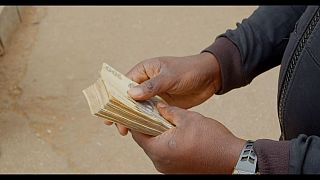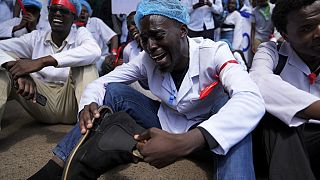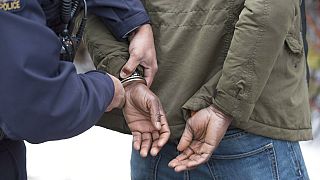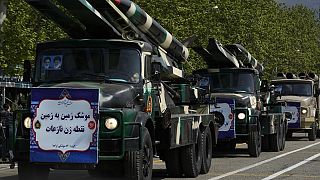Jail
Mali's only women's prison is a far cry from the squalid, overcrowded jails found elsewhere in the war-torn Sahel.
Bolle is one of the only women's prisons in Africa's Sahel region, which has been plagued by a brutal jihadist conflict since 2012.
It is also a centre for vocational training to help the women reintegrate into society once out of prison.
"All these ladies or all these girls who are in detention are doing something, they are involved an activity. We are not only a detention centre but we are also here to re-educate and to teach the detainees income-generating activities in order to prepare their reintegration into society." said Gabriel Flazan Sidibe, deputy Director of the Bollé detention centre.
Once past the rusty doors and ochre-coloured walls of the Bolle penitentiary in the capital Bamako, there is little indication that this is a prison at all.
Nineteen of the inmates hail from surrounding Sahel countries, with some coming from as far away as Nigeria and Zimbabwe.
"This will allow us to prevent them from committing crimes because we will reintegrate them into society, they will be autonomous and they will take charge of themselves, their families and serve the country." according toNiare Kadidja Babi, head of Pedagogical Unit and Vocational Training
Most of the inmates are yet to stand trial because of lengthy delays in the former French colony's under-resourced legal system.
Standards are far higher than other in prisons in Mali, where male criminals and jihadists are crammed into dark and filthy cells.
"We don't consider Bolle a detention centre," said Babou Togora, an official from Mali's prison service.
The penitentiary is similar to others in the Sahel in some respects, however.
- Delays -
Most of the inmates are yet to stand trial because of lengthy delays in the former French colony's under-resourced legal system.
A Nigerian woman in the courtyard, who declined to be named, said she has been imprisoned for 19 months, awaiting trial.
"That's how it is here," she said, in heavily accented French, with a smile.
About two thirds of the women are in a similar position, according to prison authorities.
Nineteen of the inmates hail from surrounding Sahel countries, with some coming from as far away as Nigeria and Zimbabwe.
Founded in 1999, Bolle has its origins in the turmoil triggered by Mali's 1991 coup d'etat.
During the putsch, male prisoners reportedly preyed upon female inmates.
The central prison in Bamako was one facility where men "took advantage of the revolution to abuse the female inmates," according to Inspector Gabriel Flazan Sidibe, Bolle's deputy warden.
Other prisons in Mali still contain women's sections. But Sidibe said "we are doing everything to group them" at Bolle.
- 'To err is human' -
Bolle's inmates are detained on charges of everything from infanticide to assault and involvement in the drug trade.
One prisoner, who was released a few months ago, had been detained on terrorism charges.
Many inmates are put behind bars up along with their children, who are innocent of any crime.
Binta, a woman in her twenties convicted of fraud two years ago, is locked up with her young son Nabil.
She said the boy's father comes to the prison several times a week to take him for car rides around the city, but that Nabil cries when he has to return to jail.
Moussa Bagayoko, from a local NGO that aids the imprisoned children, said that "they didn't do anything to end up here -- it's their mothers who did something wrong."
He added that the foreign funding on which Bolle relies is becoming increasingly rare.
Mariam, who is serving a 20-year sentence for killing one of her husband's other wives, said that "we need a presidential pardon".
"To err is human," she added. "No one is perfect in life."













00:48
Corpses found adrift in boat off Brazil likely migrants from Mauritania, Mali - Police
Go to video
Hellen Obiri claims back-to-back Boston Marathon titles, leading Kenyan women's podium sweep
01:07
Mali's junta bans media from reporting on political activities
00:51
Mali bans political party activities as calls for elections grow
02:35
Women rights activists react to DRC first female PM
02:07
The first woman to run for president in years inspires hope in Senegal